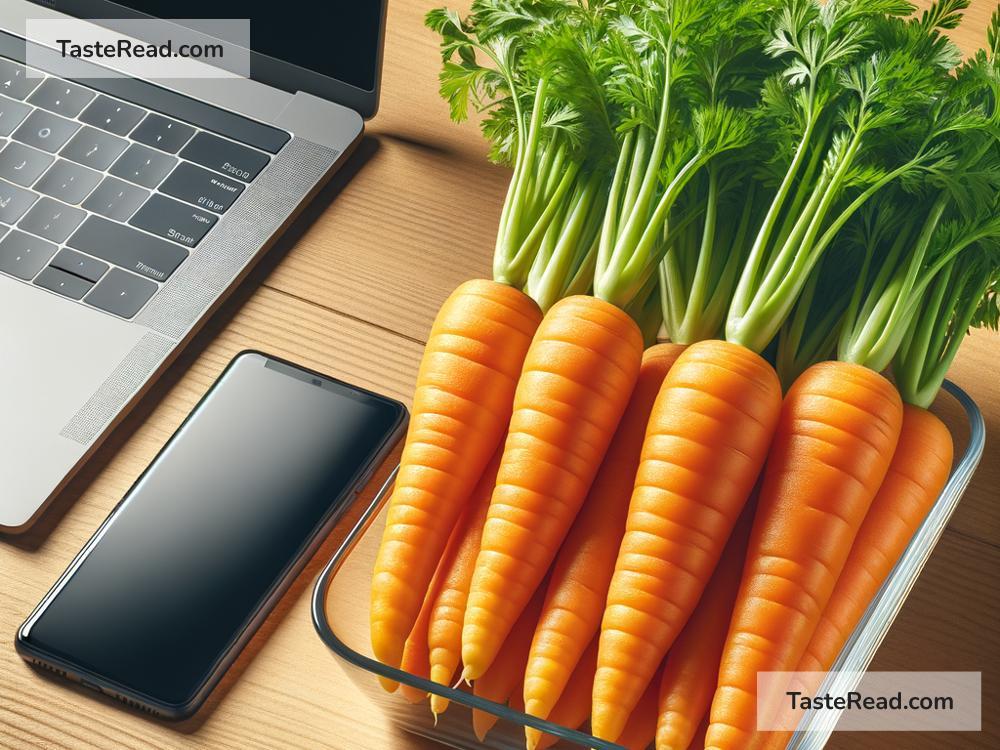Carrots: Your Secret to Better Vision in Screen-Heavy Jobs
If you spend hours in front of a screen every day, you’re not alone. Many of us have screen-heavy jobs where we work on computers, tablets, or phones all day. While these gadgets make life easier, they also take a toll on our eyes. Staring at screens for long periods can cause eye strain, dryness, blurred vision, and even headaches. But did you know that a simple vegetable — the humble carrot — might be the secret to protecting your eyes? Yes, carrots can help boost your vision, especially if your job keeps you glued to screens. Let’s dive into why carrots are great for your eyes and how they can make a difference.
Why Screen Time Harms Your Eyes
Before we talk about carrots, let’s understand what happens to your eyes during long screen hours. When you work on a screen, you blink less than usual. Blinking keeps your eyes moist and clean, so blinking less can make your eyes dry and uncomfortable. Plus, the blue light from screens can tire out your eyes and make it harder to focus over time. This is called “digital eye strain” or “computer vision syndrome.” Symptoms often include tired, scratchy eyes, blurry vision, and headaches. Over time, too much exposure to blue light can even damage your eyes.
Given how common these issues are in modern work environments, finding ways to protect your eyes is important for long-term eye health.
Why Carrots Are a Superfood for Eyes
Carrots are often associated with good vision, and you’ve probably heard people say “Eat your carrots so you can see better!” This isn’t just an old wives’ tale — it’s backed by science. Carrots are rich in nutrients that are essential for eye health, especially if your lifestyle includes screen-heavy tasks.
The star nutrient in carrots is beta-carotene, a type of antioxidant that your body converts into vitamin A. Vitamin A is crucial for maintaining healthy vision, particularly your ability to see in low light. In fact, a deficiency in vitamin A can lead to night blindness, a condition where it’s hard to see in dim light.
Here’s how vitamin A helps your eyes:
1. Keeps Your Eyes’ Surface Healthy: Vitamin A contributes to the health of the cornea, which is the clear, outer layer of your eye. A healthy cornea is key to clear vision.
2. Improves Night Vision: Vitamin A also supports the retina, the part of your eye responsible for sensing light and sending signals to the brain. This makes it easier to see in dim spaces.
3. Protects Against Eye Disease: Beta-carotene and other nutrients in carrots help reduce the risk of eye diseases like cataracts and macular degeneration as you age.
Other Nutrients in Carrots That Benefit Your Eyes
Carrots are also rich in other nutrients that promote eye health:
– Lutein: This nutrient acts like sunglasses for your eyes, protecting them from harmful blue light — the same light that’s everywhere when you work on screens.
– Zeaxanthin: Found alongside lutein, zeaxanthin helps protect your retina from damage caused by too much light exposure.
– Vitamin C: Carrots contain some vitamin C, which strengthens blood vessels in your eyes and helps fight free radicals that can damage eye tissue.
Together, these nutrients make carrots a powerhouse for maintaining sharp eyesight.
How to Add Carrots to Your Daily Diet
Carrots are versatile, tasty, and easy to add to your meals. Here are some fun and simple ideas to include carrots in your daily diet:
1. Snack on Raw Carrots: Keep some baby carrots or carrot sticks at your desk for a quick snack while you work.
2. Drink Carrot Juice: Fresh carrot juice is a refreshing way to boost your vitamin intake. You can even mix it with other fruits or veggies like orange, ginger, or spinach.
3. Add to Salads: Shredded carrots add a sweet crunch to salads.
4. Make a Stir-Fry: Carrots pair beautifully with other vegetables in stir-fries, making for a healthy and easy-to-cook dinner.
5. Bake with Carrots: Carrot cake or carrot muffins are delicious treats — healthier than most desserts!
Other Tips to Protect Your Vision
While carrots are amazing for your eyes, eating them alone isn’t enough to counteract the effects of prolonged screen time. Here are some additional habits to keep your eyes healthy:
– Follow the 20-20-20 Rule: Every 20 minutes, look at something 20 feet away for 20 seconds to reduce digital eye strain.
– Use Proper Lighting: Avoid working in dim or overly bright environments where your eyes have to work harder.
– Blink More Often: Make a conscious effort to blink regularly while using screens to prevent dryness.
– Wear Blue Light Glasses: These block harmful blue light and can reduce eye fatigue.
– Stay Hydrated: Drinking plenty of water helps keep your eyes moist and healthy.
Conclusion
Carrots may not replace your glasses or magically fix your vision overnight, but they’re definitely a powerful ally in keeping your eyes healthy. Packed with vitamin A, beta-carotene, lutein, and zeaxanthin, they can help protect your eyes against screen-related damage and keep your vision sharp. So, the next time you’re feeling tired from staring at your screen, grab a carrot! It’s a small step that can make a big difference for your eye health in screen-heavy jobs.


